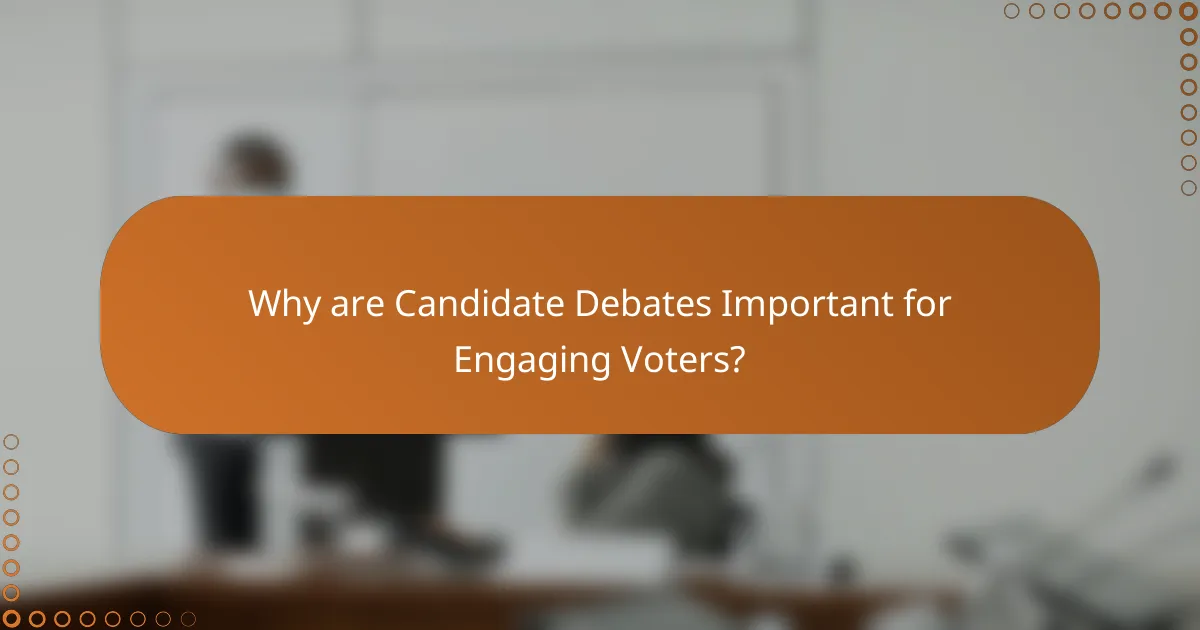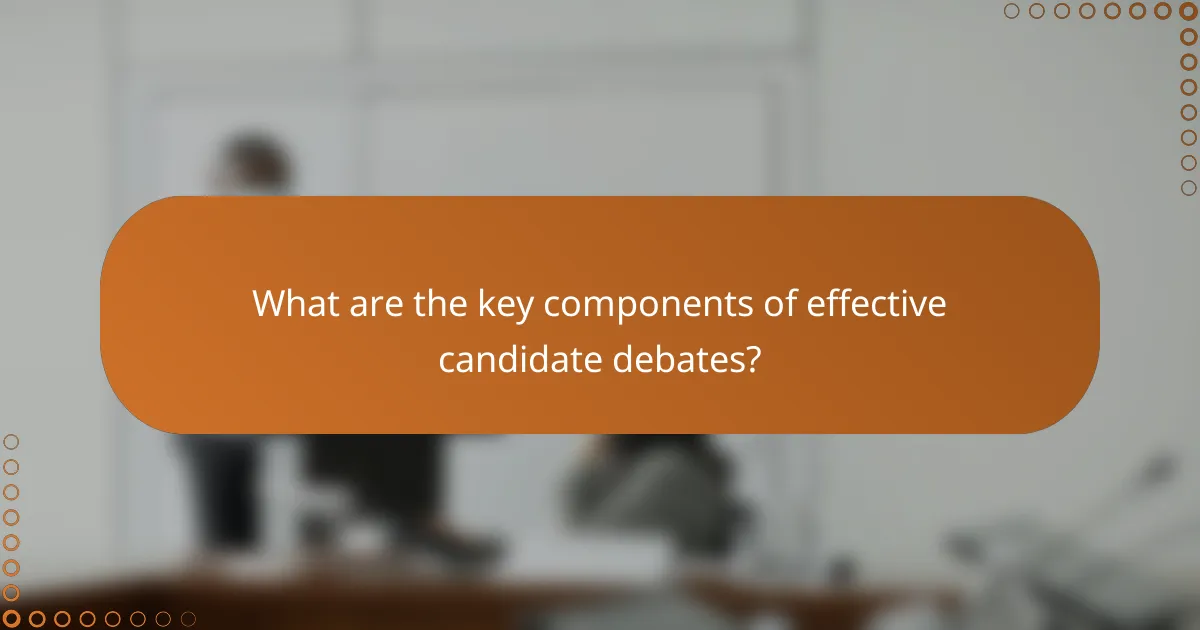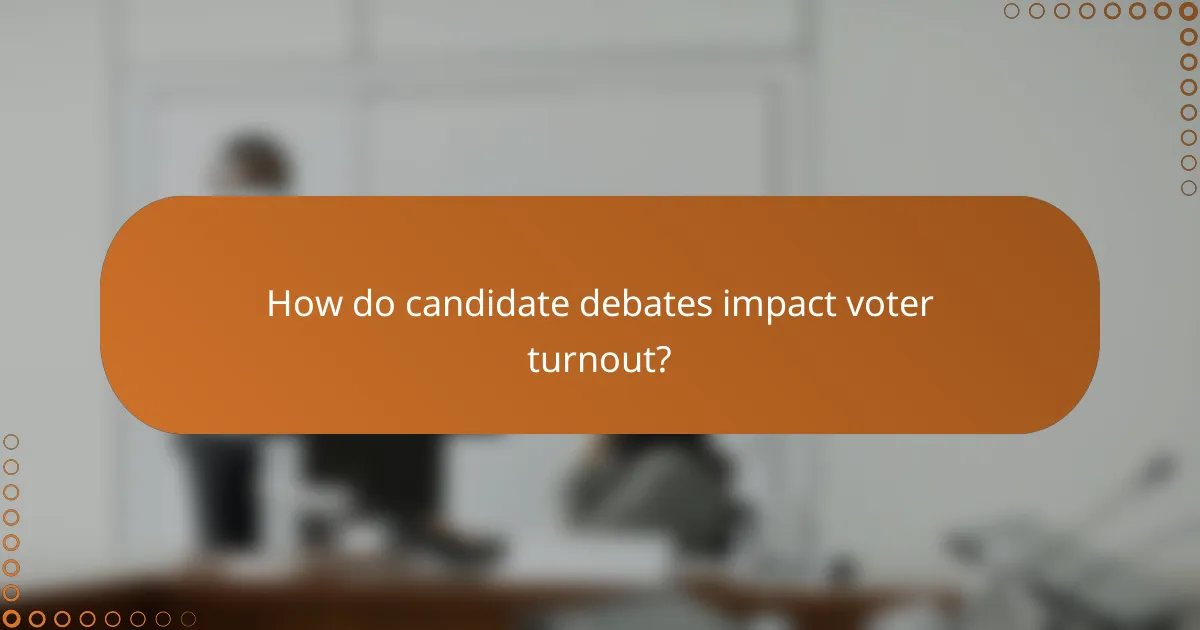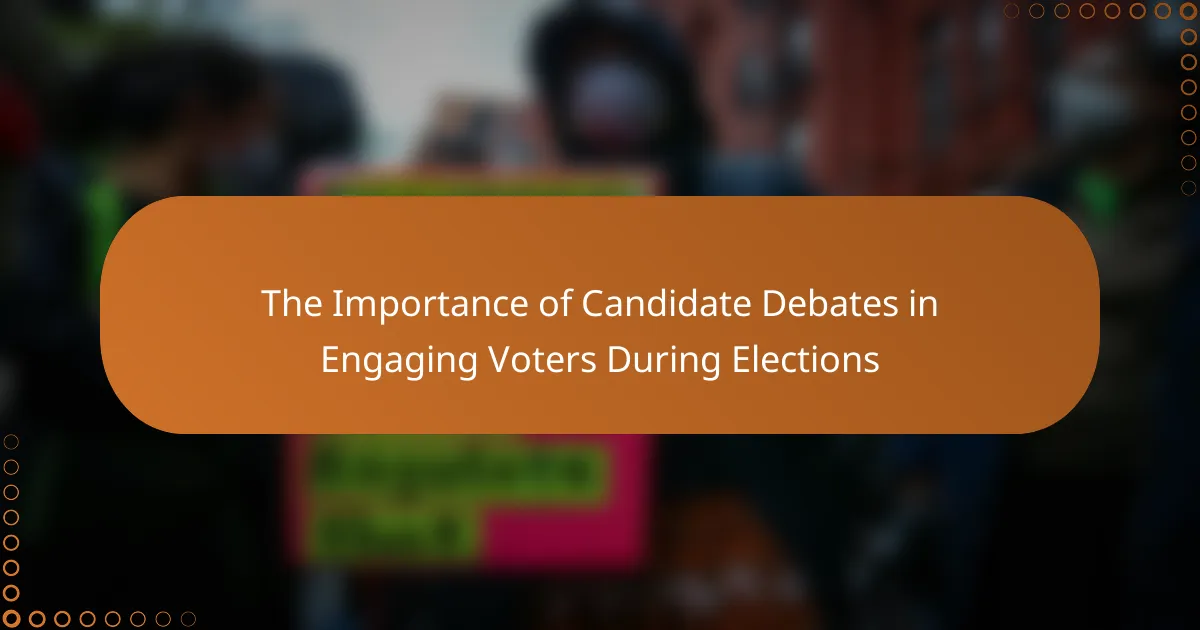Candidate debates serve as a vital mechanism for engaging voters during elections by providing a platform for candidates to present their views and compare policies directly. These debates enhance transparency in the electoral process and allow voters to assess candidates’ communication skills, which is crucial for informed decision-making. Research indicates that effective debates, characterized by clear communication, structured formats, and audience engagement, can significantly influence voter perceptions and increase turnout. Studies show that debates can boost voter participation by up to 20% among informed voters, highlighting their importance in energizing the electorate and facilitating democratic participation.

Why are Candidate Debates Important for Engaging Voters?
Candidate debates are important for engaging voters because they provide a platform for candidates to present their views directly. Debates allow voters to compare candidates side by side. This format enhances transparency in the electoral process. Voters can assess candidates’ communication skills and policy positions. According to a 2020 Pew Research study, 66% of registered voters reported that debates help them make informed decisions. Debates also stimulate public interest and discussion about key issues. This engagement can lead to higher voter turnout. Overall, debates serve as a crucial mechanism for democratic participation.
How do candidate debates influence voter perceptions?
Candidate debates significantly influence voter perceptions by shaping opinions and providing a platform for candidates to present their views. Debates allow voters to assess candidates’ communication skills and policy positions directly. According to a study by the Pew Research Center, 67% of voters reported that debates helped them make a decision about whom to support. Additionally, debates can create memorable moments that become focal points in the campaign narrative. For instance, a candidate’s strong performance can lead to increased poll numbers, while a poor showing may result in a decline in support. Overall, candidate debates serve as critical events that can alter the trajectory of an election by impacting how voters perceive candidates.
What role do debates play in shaping public opinion?
Debates play a crucial role in shaping public opinion by providing a platform for candidates to present their views. They allow voters to compare candidates directly. This comparison influences perceptions of competence and credibility. Studies show that debates can significantly impact voter decisions. For instance, a Pew Research Center study found that 70% of viewers reported changing their opinion after a debate. Debates also highlight key issues, guiding public discourse. This focus helps voters prioritize concerns that matter to them. Overall, debates are instrumental in informing and influencing voter attitudes during elections.
How do candidates use debates to showcase their platforms?
Candidates use debates to showcase their platforms by articulating their policies and positions directly to voters. They present key issues that resonate with their target audience. Debates allow candidates to highlight their unique solutions to pressing problems. They also provide an opportunity to contrast their views with opponents. Candidates often use persuasive rhetoric to strengthen their arguments. Additionally, they respond to questions that reflect voter concerns. This interactive format helps candidates demonstrate their knowledge and quick thinking. Historical data shows that debates can significantly influence voter perceptions and decisions.
What historical significance do candidate debates hold?
Candidate debates hold significant historical importance as they have shaped political discourse and voter engagement. The first televised debate occurred in 1960 between John F. Kennedy and Richard Nixon. This event marked a turning point in how candidates communicated with the public. Debates have since become a platform for candidates to present their policies directly to voters. They allow for real-time scrutiny and comparison of ideas. Historical data shows that debates influence public opinion and can sway election outcomes. For instance, studies indicate that Kennedy’s performance in the 1960 debate helped him gain a competitive edge. Overall, candidate debates have evolved into a critical component of the electoral process, impacting voter decisions and shaping political narratives.
How have debates evolved over time in electoral politics?
Debates in electoral politics have evolved significantly over time. Initially, debates were informal and often took place in public spaces, focusing on local issues. The first formal presidential debate in the U.S. occurred in 1960 between John F. Kennedy and Richard Nixon. This debate marked a shift towards televised discussions, which increased public engagement. Over the years, debates have become more structured, with specific formats and rules. They now include multiple candidates and are often moderated by journalists. The rise of social media has also transformed debates, allowing for real-time audience interaction and feedback. Today, debates are a crucial component of electoral campaigns, shaping public perception and voter decisions.
What landmark debates have changed the course of elections?
The landmark debates that have changed the course of elections include the 1960 Kennedy-Nixon debate, the 1984 Reagan-Mondale debate, and the 2008 Obama-McCain debate. The 1960 debate marked the first televised presidential debate, significantly impacting public perception of candidates. John F. Kennedy’s confident demeanor contrasted with Richard Nixon’s appearance, influencing voter opinions. The 1984 debate showcased Ronald Reagan’s effective communication skills, reinforcing his popularity. His performance helped secure a landslide victory against Walter Mondale. In 2008, Barack Obama’s debate performances against John McCain highlighted his policy knowledge and charisma, contributing to his election success. These debates exemplify how televised exchanges can sway public opinion and alter electoral outcomes.

What are the key components of effective candidate debates?
Effective candidate debates include clear communication, structured formats, and audience engagement. Clear communication ensures candidates articulate their policies and positions effectively. Structured formats, such as time limits and question rounds, facilitate orderly discussions. Audience engagement involves addressing voter concerns and encouraging participation. Research indicates that debates can influence voter perceptions and decisions. A study by the American Political Science Review found that debates significantly affect polling numbers. These components work together to create impactful debates that resonate with voters.
How do debate formats affect voter engagement?
Debate formats significantly influence voter engagement. Different formats can enhance or diminish audience participation. For instance, town hall-style debates encourage direct interaction between candidates and voters. This format often leads to higher engagement levels, as voters feel their concerns are addressed. In contrast, traditional formats with strict time limits may limit discourse. Studies show that formats allowing for more spontaneous interactions result in increased viewer interest. A 2020 study by the Pew Research Center found that 65% of viewers felt more engaged during informal debate formats. Thus, the structure of a debate plays a crucial role in shaping voter involvement.
What types of debate formats are commonly used?
Commonly used debate formats include Lincoln-Douglas, Policy, and Public Forum debates. Lincoln-Douglas debates focus on values and ethics, typically involving two participants. Policy debates center on specific policy proposals and feature teams of two. Public Forum debates emphasize current events and involve teams of two arguing for or against a resolution. These formats are widely recognized in competitive debate circuits. Each format has its own rules and structure, catering to different styles of argumentation.
How does the structure of a debate impact its effectiveness?
The structure of a debate significantly impacts its effectiveness by influencing clarity, engagement, and persuasion. A well-defined format allows for a clear presentation of arguments. This clarity helps the audience understand each candidate’s position. Structured time limits ensure that all candidates have equal opportunities to speak. This fairness promotes engagement from both candidates and the audience. The use of rebuttals within the structure encourages direct confrontation of opposing views. This dynamic can enhance persuasive power as candidates respond to each other’s arguments. Research shows that structured debates lead to higher retention of information among viewers. A study by the Pew Research Center found that structured debates improve voter understanding of candidates’ policies. Therefore, the effectiveness of a debate is closely linked to its structural design.
What strategies do candidates employ during debates?
Candidates employ several strategies during debates to effectively engage voters. They often utilize clear messaging to communicate their key policies. This clarity helps voters understand their positions. Candidates also focus on rebuttals to counter opponents’ arguments. This demonstrates their knowledge and readiness to defend their views. Additionally, candidates use body language to convey confidence and approachability. Positive body language can enhance their appeal to voters. Another common strategy is to highlight personal stories or experiences. This can create an emotional connection with the audience. Candidates may also employ fact-checking to establish credibility. By citing statistics or data, they reinforce their arguments. These strategies collectively aim to persuade undecided voters and solidify support.
How do candidates prepare for debates to engage voters?
Candidates prepare for debates by researching key issues and understanding voter concerns. They analyze past debates to identify effective strategies. Candidates also practice their responses through mock debates with advisors. They focus on clear messaging to resonate with voters. Additionally, candidates study their opponents’ positions to anticipate counterarguments. Engaging voters requires candidates to convey authenticity and relatability. They often refine their speaking skills to improve delivery. This preparation ultimately aims to create a strong connection with the electorate.
What rhetorical techniques are most effective in debates?
Effective rhetorical techniques in debates include ethos, pathos, and logos. Ethos establishes credibility and trustworthiness. Candidates who demonstrate expertise or integrity can persuade audiences more effectively. Pathos appeals to emotions, creating a connection with the audience. Emotional stories or passionate delivery can influence voter perceptions. Logos uses logical reasoning and evidence to support arguments. Clear facts and statistics strengthen a candidate’s position.
Research shows that debates utilizing these techniques can significantly impact voter opinions. According to a study by the Pew Research Center, emotional appeals in political messaging can increase voter engagement and persuasion.

How do candidate debates impact voter turnout?
Candidate debates significantly impact voter turnout by increasing public interest and engagement in the electoral process. Research indicates that debates provide voters with critical information about candidates’ policies and positions. This exposure often leads to a higher likelihood of voter participation. According to a study by the Pew Research Center, debates can boost turnout by as much as 20% among informed voters. Furthermore, debates create a platform for candidates to articulate their visions, helping undecided voters make informed choices. Engaging discussions during debates can energize the electorate, motivating individuals to vote. Overall, the visibility and accessibility of candidate debates play a crucial role in enhancing voter turnout during elections.
What evidence supports the relationship between debates and voter participation?
Candidate debates significantly enhance voter participation. Research indicates that debates increase voter awareness and interest in elections. A study by the Pew Research Center found that 63% of debate watchers reported being more likely to vote. Additionally, debates provide a platform for candidates to communicate their policies directly to voters. This direct engagement fosters a better understanding of issues. The National Election Pool exit polls show that debate viewers are more informed about candidates’ positions. Overall, the evidence strongly supports the notion that debates play a crucial role in motivating voter turnout.
How do debates motivate undecided voters to make a choice?
Debates motivate undecided voters to make a choice by providing direct comparisons between candidates. They showcase candidates’ positions on key issues. This clarity helps voters understand differences in policy and personality. Research indicates that 70% of undecided voters make a decision after watching debates. Candidates’ performances can sway opinions significantly. Emotional appeals and persuasive arguments during debates influence voter perceptions. The interactive nature of debates allows voters to see candidates in real-time. This visibility often leads to increased voter engagement and decision-making.
What demographic factors influence voter engagement through debates?
Demographic factors influencing voter engagement through debates include age, education level, income, and ethnicity. Younger voters tend to engage more actively when debates address their concerns. Higher education levels correlate with increased debate viewership and participation. Income affects access to information and engagement levels. Ethnic diversity influences perspectives and engagement, as differing cultural backgrounds may prioritize various issues. Research shows that debates resonate more with demographics that feel represented in the candidates’ platforms. For instance, a study by the Pew Research Center indicates that minority groups often engage more when candidates address issues pertinent to their communities.
What can candidates do to maximize the impact of their debates?
Candidates can maximize the impact of their debates by preparing thoroughly. They should research their opponents’ positions and anticipate questions. Practicing responses can enhance their confidence and delivery. Candidates must also focus on clear and concise messaging. Articulating key points effectively resonates with voters. Engaging with the audience through eye contact can create a connection. Utilizing personal stories can make their message more relatable. Finally, remaining calm under pressure demonstrates composure and leadership.
How can candidates effectively communicate their messages during debates?
Candidates can effectively communicate their messages during debates by using clear and concise language. They should focus on key points that resonate with their audience. Engaging storytelling can make messages more relatable and memorable. Candidates must also practice active listening to respond appropriately to opponents. Body language plays a significant role in conveying confidence and sincerity. Visual aids can enhance understanding of complex topics. Lastly, candidates should prepare for potential questions and counterarguments to maintain control of the discussion. These strategies have been shown to improve audience engagement and retention of information during debates.
What common mistakes should candidates avoid in debates?
Candidates should avoid being unprepared during debates. Lack of preparation leads to poor responses and weak arguments. Candidates must also refrain from interrupting opponents. Interruptions can appear disrespectful and diminish their credibility. Additionally, candidates should avoid using jargon or overly complex language. Clear communication is essential for voter engagement. Failing to address key issues is another mistake. Candidates should focus on relevant topics that matter to voters. Lastly, candidates must not ignore their body language. Negative body language can undermine their message and influence perceptions.
What are best practices for voters to engage with candidate debates?
Voters can engage effectively with candidate debates by preparing in advance. Research candidates and their positions on key issues. Take notes during the debate to track responses and arguments. Ask questions that are relevant to personal concerns and community issues. Discuss the debate with others to gain different perspectives. Utilize social media to share thoughts and engage with candidates directly. Follow up by voting based on informed opinions. Engaging in this manner enhances understanding and participation in the electoral process.
The main entity of the article is candidate debates, which are essential for engaging voters during elections. The article explores the significance of debates in enhancing voter awareness, shaping public opinion, and influencing voter turnout. Key aspects include how debates allow for direct comparison of candidates, the strategies employed by candidates to communicate their platforms, and the historical evolution of debate formats. Additionally, it addresses the impact of demographic factors on voter engagement and outlines best practices for both candidates and voters to maximize the effectiveness of debates in the electoral process.
